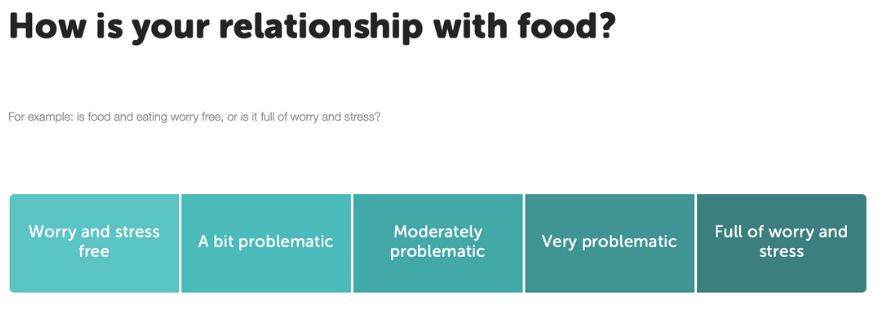In a co-design with people with lived experience of an eating disorder, InsideOut has developed the InsideOut Institute Screener (IOI-S), a brief online screening tool for the purposes of identifying eating disorder risk and symptomatology, aimed specifically at increasing help-seeking behaviour early in the treatment course.
We speak to InsideOut researcher Emma Bryant about why a screener of this time is needed and how it can help people with eating disorders.
Q. Why is early intervention particularly important for eating disorders?
A. Early intervention has been shown to improve prognosis in all the major psychological disorders. Although full recovery is possible for anyone with an eating disorder, the earlier an individual receives help, the easier it will be to achieve.
This is particularly true of this illness group because of the powerful, egosyntonic value of eating disordered behaviours, which, despite the devastating effect they can have, tend to become more ingrained the longer they are left untreated. It has also been shown that existing evidence-based treatments for eating disorders are more effective if delivered earlier in the illness.
Q. What is the IOI screener exactly? How can it help with early intervention?
A. The IOI-S is a brief, 6-item screening tool originally designed and validated for online use. It assesses for eating disorder risk and symptomatology using sensitive, non-confrontational language.
Seeking help is extremely daunting for many people, and we live in the digital age – in fact, a study completed just prior to the pandemic showed 84% of Australians search online for healthcare information before going anywhere else (I imagine that’s increased during the pandemic!).
So, we wanted to design a tool that people could access in their own time, in the privacy of their own home, to see if they might need to seek help – and to gently encourage them to do so.
The questions cover known facets of eating disorder pathology and were co-designed with individuals with lived experience so that they reflect the experience or presentation of early symptomatology and are easily comprehensible.

Q. Tell us about your research.
A. My research psychometrically validated the screener – in other words, tested it to make sure it both measures what it is supposed to measure, and is sensitive to risk and symptomatology (correctly identifies eating disorder behaviour). We had over 1500 people aged between 14 and 74 from all walks of life complete the screener alongside existing validated measures of eating disorder symptomatology, in order to test for known parameters of statistical validity.
Q. What were the research findings?
A. The screener demonstrated excellent psychometric properties, including high internal consistency; strong concurrent, convergent and discriminant validity; very high sensitivity and specificity and excellent test-retest reliability.
In other words, it appears to be highly valid in individuals ages 14-74 and can accurately identify not only individuals who may already be struggling with an eating disorder, but also two stepped levels of risk (medium and high).
Q. What are the implications of these findings?
A. We really need to get more people to seek help – currently only 1 in 4 people with an eating disorder is receiving any form of treatment.
Utilising digital technologies, particularly when our most at-risk population (young people) is extremely digitally-connected, may enhance such opportunities. As I said, the screener can be accessed anywhere by anyone – it doesn’t assume someone has already turned up to their GP.
It will help people identify if they are at risk or the way they are feeling is something that can be addressed with the right care. They can take it to their healthcare professional if they want to have a conversation about it, or indeed it may also be suggested by a healthcare professional, who can look at the results and devise a treatment plan if necessary.
In fact, the screener showed such excellent psychometric properties that we are currently validating it for face-to-face use in headspace and primary care, as well as in a slightly younger age group – down to 12.
Q. How can this screener be used to improve outcomes for people with eating disorders?
A. Seeking help early is one of the single greatest factors that can predict good outcome.
Any measure that aims to encourage or initiate early help-seeking has the potential to improve outcomes, if employed in conjunction with strategies to enhance motivation and effective psychotherapies.
We hope this will become just one of the significant tools in a very large toolbox!
Q. What more needs to be done when it comes to early intervention?
A. I am a big believer in the importance of prevention programs and think we need to be working collaboratively with the government and education sectors to implement sophisticated psychoeducation initiatives in primary and high schools. Universal screening may also have its place – whereby all adolescents are routinely screened during particular risk periods for mental health disorders, including eating disorders. Certainly, much research can (and should) be undertaken in this area going forward.
Q. What is your next move? Where to now for your research?
A. For now, the focus is on my PhD research, which will examine core psychopathology and illness course in Anorexia Nervosa using machine learning models, co-designed with individuals with lived experience.
The aim is to reconceptualise or more thoroughly understand illness phenomena in order to identify more effective therapeutic targets.
About Emma
Emma Bryant is an early career researcher and PhD candidate at Insideout with a big future. This year, Emma achieved first place in the ANZAED/AED Early Career Travel Scholarship and won the Peter Beumont Young Investigator Award. Her primary research interests are Severe and Enduring Anorexia Nervosa, genetics of eating disorders, illness phenomenology and early intervention. She is the lead investigator on all studies assessing and validating the InsideOut Institute Screener, a brief eating disorder screener designed to identify early risk and symptomatology. In her free time she likes to spend time with her dog in the bush and at the beach.

Cover image: Unsplash, Tianyi Ma

